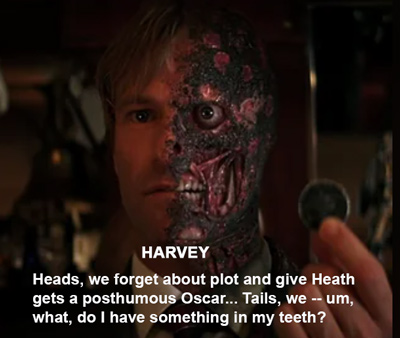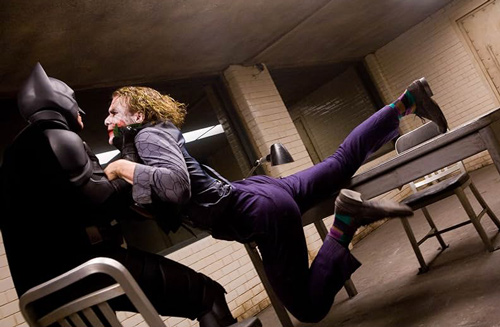The Dark Knight is an interesting movie, but not a great one. It’s worth seeing, an eye-popping respite from the heat, with cool explosions and Bat-gadgets. It is also a stunning swan song for Heath Ledger, but Batman Begins is better, and Iron Man still rules as the summer blockbuster 2008.
I so wanted this to be the summer winner, and it might be the high-grosser, but alas… The conversation continues:
WARNING: Spoilers!
It is clearly a story of doubling. Harvey Dent has Two-faces. Batman battles in two cities. We also have two fake Batmans, two supposed unmaskings of Batman, and the Joker provides us with not one but two hard two-choice dilemmas. So why does this nerve-shaking, DC Comic thrill ride feel as real as Harvey’s two-headed coin?…
The story begins with the Joker robbing a mob bank, which he’ll use it to get the mobsters’ attention so they’ll hire him to kill Batman. Huh?
Then we see Batman bring in Scarecrow in a weak scene that doesn’t highlight either character’s unique specialties. Scarecrow, instead of upping his technique for greater impact, is reduced to a guy with a sack on his head, while Batman forgets his ninja training and weapons and has reverted to his old pugilistic tendencies.
We are then introduced to Harvey Dent, giving the Joker room to play with mobsters and grow into a menace, and we develop the theme of embracing what we hate in order to achieve order. Batman spends his time mulling over how much violence he must use to achieve his ends, continually fearing to break his “one rule,” namely, “Thou shalt not kill.”
But Batman doesn’t want anything specific. His battle is ongoing, and his moral fortitude is wavering. He wants others to take over. He’s thinking of quitting. He wants to settle down with Rachel, all of which we don’t believe and know he can’t do. Fortunately the film doesn’t give us much time to consider it. He must attack the Joker any way he can, find him any way he can, but not kill him, which weighs on us more and more as others, like Harvey, do the dirty work for him.
My favorite moment connected to that theme is the Joker’s demand to kill Reese, the accountant who discovers Bruce’s identity, or the Joker will blow up a hospital. This creates a panic in the populace but it never becomes a true dilemma because no one besides the mob ever considers killing Reese. Why didn’t Bruce consider shutting him up before he goes on air? Why was the threat against Reese dropped after the hospital comes down?
We’re told Gordon’s “death” allows him to devise a plan to bring in the Joker, but that sequence actually begins with the Joker demanding Batman turn himself in (though later he doesn’t want because Batman’s too much fun). Then Harvey, who doesn’t know of the “secret plan,” claims to be Batman and takes the blame.. Batman doesn’t approve of this but goes along with it because he can’t stand the carnage any more.
So Harvey is arrested and taken across town, presumably to lure the Joker. After the city loses multiple cops and vehicles, including a helicopter, the Joker nearly succeeds in blowing up Harvey with a bazooka and almost kills Batman with a knife. Only then does Gordon reappear from nowhere to slap the cuffs on and take credit for this half-assed Pyrrhic victory.
The story’s best dilemma comes Act II climax when Batman must choose between Rachel and Harvey. Only Bruce doesn’t debate it. It would have been dramatically interesting, but by now we know he’ll try to save Rachel. This allows us to fall for a great twist.
Act III makes the same mistake that Superman Returns made – its climactic moments, though potentially more devastating in terms of body count, fall short emotionally. With Rachel gone and Harvey off killing cops, we lose interest. Plus, Bruce is never asked to choose between boats. Not that we care because we’re not emotionally invested in them and too exhausted to make new friends.
The ending also fails to satisfy, not just because Harvey’s vengeance against Gordon is misplaced, nor because we’ve seen this scene so many times before, but because our central antagonist, Joker, doesn’t join in the fun. Then our great Bat-ninja strolls in like Hamlet’s ghost with moral words, then pounces like a pro wrestler!
Batman doesn’t have much fun in this movie. Yes, he gets to dive off buildings, crash through multiple windows and get airlifted out of China, but he spends most of his time moralizing, idolizing Harvey while puzzling over Joker – both of whom upstage him. He wiretaps the city phones (a culturally relevant plot point), but it still feels weak because neither Batman nor anyone else justifies its ongoing use to stop terrorism!
As for Rachel Dawes – I never thought I’d say it – but Katie Holmes Cruise was better. Maggie Gyllenhaal may be tougher and less pretty, but she practically sleepwalks through her role. Her character is still unconvincing as Bruce’s love interest, and as Harvey’s. There isn’t a “dance scene” for either one with her, no romance besides the few kisses the plot allows, so her death doesn’t achieve the emotion it was designed to achieve.
So from a screenwriter’s perspective, we have a siege story (and a testing story for Batman) with a passive protagonist (bad for Batman), with an poorly defined want (he wants to be just violent enough so that Harvey can finish the job), a redundant need (all you need is love), muddled antagonisms (so how did Joker get that face?), a weak love interest, unfocused plotting and no character arc (he still thinks he didn’t break his one rule). That’s a lot to deal with.
In Batman Begins, he went from naive rich-kid vigilante to Ninja superhero who knew the value of life. So now I was hoping to see Batman realize the limits of his dark side, struggle with his power (should he really tap phones, abduct foreign mobsters off foreign soil, kill those who discover his identity, etc.) but he never debates it. Those musings about killing and unmasking were not moral debates, but tactical.
I would have liked to see Batman take gradually darker but justifiable steps away from his core values in order to find the Joker. Unmasking doesn’t violate his values, and we also know it won’t stop the Joker. Instead, let Batman claim surveillance rights that cause further and more direct consequences than Fox’s resignation. Say, Batman frees another killer in order to lure Joker out. Citizens die as a result, and somehow Gotham learns that Batman violated their privacy. So Batman justifies it, takes another darker step, until he’s faced with a dilemma that will break him or define him. The line he won’t cross.
Oh, about that one rule – Harvey didn’t trip and fall off that building.
What do you think?
